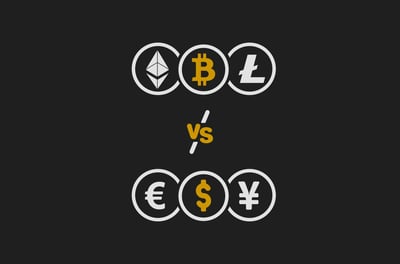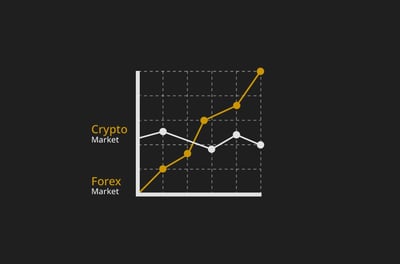Table Of Contents
- Similarities between Crypto Markets And FOREX Markets
- Crypto Trading vs. FOREX Trading
- Cryptocurrency Trading Landscape
- The Difference between Investing and Trading Cryptos
- FOREX Trading Landscape
- Differences between Crypto Markets and FOREX Markets
- Number of instruments
- Liquidity
- Difference between coins
- Emergence of non-fungible tokens (NFT)
- Volatility
- Profit potential
- Market hours
- Security
- Choosing between Crypto Trading and FOREX Trading
- How Much Time you Can Devote to Trading
- Conclusion
Crypto Trading and FOREX Trading: How to Choose What’s Best For You
As cryptocurrency trading grows in popularity, investors are starting to wonder which is the better route to take – crypto trading or FOREX trading. They are also asking themselves if they could master both fields at the same time to get the best of each.In this short article, I will examine this question from a range of angles. I will guide you, the investor/trader, by highlighting the key differences and similarities between these two widely popular investment instruments. By the end of the article, I hope that you will be better placed to decide which instrument to favor as you construct your portfolio. I've also included a frequently asked questions section that addresses common questions about these two asset classes.
Both crypto and FOREX trading are influenced by supply and demand dynamics, market sentiment, and require active monitoring.
Crypto offers high volatility and the potential for big wins or losses, while FOREX is more stable and better regulated.
FOREX trading involves fiat currency pairs like USD, EUR, and JPY, whereas crypto deals with digital assets like Bitcoin and Ethereum.
Crypto trading is less liquid and riskier but offers 24/7 market access, while FOREX has higher liquidity and operates 24/5.
Traders should choose between the two based on risk appetite, time commitment, and financial goals.
FOREX is supported by intermediaries and macroeconomic signals, while crypto benefits from blockchain technology and decentralization.
Leading brokers for both markets include ICM, XTB, IG Markets, and Dukascopy, many of which now offer seamless access to both asset classes.
Similarities between Crypto Markets And FOREX Markets
It's no surprise that I declare that the world’s trading markets are very well developed. As a new investor, getting into trading is relatively easy, as all you need is a smartphone or a laptop and a stable internet connection. You will be vetted by the online broker of your choice, and you will need to supply key identification information.From that point, you can trade both cryptocurrencies and FOREX with a few restrictions. Both markets are driven by the dynamics of supply and demand. This means the price climbs when there are more buyers than sellers and then falls when everyone is selling. You will learn quickly that FOREX is the more established trading asset while crypto is still relatively new, although it is growing fast.
If you have not traded crypto yet, its volatility may surprise you. It certainly surprised me when I began! Crypto trading is only a little over a decade old, and its extreme sensitivity to market sentiment is part of its development as a financial instrument. FOREX, in its own way, is also moved by market sentiment, but on a much more macro or wider scale. Where cryptos might swing by a few percentage points on the back of a breaking crypto scandal, individual FOREX currencies are prone to minor movements or slippages relating to global political and economic news. It will pay you to become better at understanding the way the global economy works.
To start, let's get some of the most important similarities between crypto and FOREX out of the way:
Both instruments respond to market forces of supply and demand.
Both instruments respond to market sentiment.
Both assets are high touch, meaning they will need active monitoring, unlike, say, long-term bonds that you buy and leave alone for extended periods.
It is easy to trade and handle transactions on both instruments with a good broker.

Crypto Trading vs. FOREX Trading
Crypto trading, just like FOREX, is about trading currencies. FOREX trading is older and more established and relates to trading currencies that are legal tender, known as “fiat” currencies, which feature major pairs. By contrast, crypto is about trading digital currencies like Bitcoin and Ethereum.FOREX is the most liquid market in the world. The FOREX market comprises major global currencies traded against one another (major pairs) and currencies of small and developing nations traded against one another (exotic pairs). The rules of the FOREX trade have long been established and it is a relatively stable trading instrument.
Crypto, by comparison, is a newcomer on the scene. Due to the wild swings that often come with crypto, traders can make lots of money quickly, but they can also lose it quickly. Regulators around the world are still trying to create regulatory certainty around these digital instruments, and even central banks are deciding what to do about crypto.
The FOREX trading market is characterized by intermediaries, brokers and other players that supply complementary services like liquidity, insurance and clearing. These “middlemen” attract fees every step of the way, diluting your profits. Crypto, on the other hand, is still largely free of many of these intermediaries. Having said that, the rise of crypto exchanges provides a trustworthy central point for crypto to be traded. Not only that, crypto exchange traded funds (ETFs) have sprung to prominence, allowing for less risky investment in crypto. Let’s understand the two landscapes a little better.
Cryptocurrency Trading Landscape
You will have seen that cryptocurrencies are defined as a new payment form underpinned by blockchain technology. This digital asset allows decentralized peer-to-peer transactions between parties all over the world. Cryptocurrencies are welcomed by many who see them as a necessary challenge to the old order of international financial transactions.Crypto is not (yet) controlled by central banks or governments, giving individuals access to a market in which they have autonomy. Crypto also offers itself up to the unbanked, as you do not need all the identifying information that is required with traditional currency. One of the drawbacks of the freedom crypto offers is that this unregulated space can leave investors prey to crypto scams.
Crypto has grown rapidly over the past decade, with well over 20,000 cryptocurrencies and tokens now in existence, and new projects continuing to launch regularly. Bitcoin, the largest and most established cryptocurrency, has delivered extraordinary long-term gains, rising from a value of fractions of a cent in its early years to tens of thousands of dollars per coin, representing an increase of many millions of percent since its launch in 2009.
Most cryptocurrencies operate on blockchain technology, which uses advanced cryptography and distributed ledgers to secure transactions and record ownership. When implemented correctly, these systems are highly resistant to tampering and fraud, making the underlying technology itself extremely robust. However, while blockchains are generally secure by design, risks often arise from how crypto assets are stored, accessed, or managed, rather than from the technology itself.
There is great excitement among investors for the future of crypto as they believe it is inevitable that it will take up a mainstream role in the global financial system. Unfortunately, or fortunately for speculators, cryptocurrencies are highly volatile. This is because they face almost daily attacks on their legitimacy and place in the financial world.
Cryptos do not have a central controlling authority, and research and development of their tools is driven by early investors and early adopters. Crypto is still in a precarious position, meaning that until there is a groundswell of support and acknowledgement at governmental levels, it will remain as the upstart technology form that is prone to volatility.
Recommended Brokers
The Difference between Investing and Trading Cryptos
Typically, crypto investors buy their chosen cryptocurrency for the medium term as they hope the price will go up. They plan to sell it when they are comfortable with the profit margin. Traders still view cryptocurrencies as a quick way to make profit. This differs from investors and other stakeholders, like technology investors, who are truly in it for the long term. This is why you typically don’t buy the underlying asset to keep it in a crypto wallet, but trade, or speculate, on its performance through Contracts for difference (CFDs) or the EFTs we have described.That said, by trading crypto, you must be alert to constant price changes and you also must watch the news cycle. Many factors impact cryptocurrency prices, which include:
High-profile stories of crypto being used for illicit activities.
Countries announcing that they are banning cryptocurrencies, like India and China.
Large scale cyber-attacks on crypto exchanges.
High profile business figures giving a positive (or negative) opinion on the future of the asset.Different cryptos have different levels of volatility, with new cryptos and what are known as meme cryptos particularly open to wild swings. Established cryptos, like Bitcoin and Ethereum, are volatile when compared to such commodities as gold, but are much less volatile than some of the most obscure cryptos.
FOREX Trading Landscape
As I've mentioned, the FOREX market is much more mature than the crypto market. You can trade major currency pairs, minor currency pairs, and exotic currency pairs. The FOREX market is open 24 hours a day during the week. Crucially, as a developed market, online brokers have learned how to translate the financial news around us into what is known as “signals,” which are useful pieces of information that can give you better insights on what to do with your FOREX assets.
The FOREX market is conducted over the counter (OTC) on the interbank market. The performance of global currencies is swayed by such macroeconomic factors as GDP news, unemployment updates, inflation movements, interest rates, national debt levels, and political events. FOREX instruments are also interlinked in complex ways with such other assets as gold and commodities.
FOREX trading requires significant time and experience to master. Ideally, you want to buy a currency hoping its value will go up so you can sell it for a profit later. This is called “going long.” Throughout, you will need to track its movement by listening to market signals. The better you get at this, the more you can make from the exercise.

Differences between Crypto Markets and FOREX Markets
I would say that there are key differences to keep in mind when you assess the two markets:
Number of instruments
The FOREX market includes major currencies like the USD, the EUR, the GBP, the JPY, and the AUD. Pairing a major currency with an exotic currency that is subject to more volatility could yield bigger profits, but also bigger losses.
A good online FOREX broker will normally have over 50 FOREX pairs available to trade, which takes care of the main combinations. There is enough variety here for FOREX traders to be satisfied.
With cryptos, the thousands of crypto types already in existence are constantly being expanded as it is relatively simple to set up a new crypto with blockchain technology. In the same way that FOREX traders often stick to a small group of major currencies, many crypto traders stick to established cryptos like Bitcoin, Ethereum, Ripple, Tether and Binance Coin. It should be clear that on a practical level, it is impossible to seriously trade any more than a few dozen assets at any one time.
Liquidity
FOREX is the largest financial market in the world, with recent estimates putting the daily trading volume of FOREX at $7 trillion. No matter your position size, you can always buy or sell your chosen instrument without any real slippage. This is part of the benefit of taking part in a large and established market like FOREX. It is mature enough to be well capitalized and regulated, and liquidity is never a problem.
Crypto is not as liquid. By comparison, its annual trading volume has been recently estimated at $1 trillion, which is still way off the volume of FOREX; and almost half of all crypto volume is made up of Bitcoin. This disparity in market size points to the immaturity of crypto, which naturally affects the liquidity of the ecosystem.
Difference between coins
There are already a great many crypto coins available, and the number is always on the increase. FOREX has a limited number of currencies that are well proven. No material change to this number is expected unless a raft of new countries and currencies comes into existence, which is highly unlikely.
The large (and growing) number of crypto types means that traders must always be on their toes to keep up with the sheer range of choices. There is a downside to this variety as traders can spread themselves too thin. It is difficult to argue that having the choice of thousands of cryptos, many of them materially insignificant, is a game-changer for traders.
Emergence of non-fungible tokens (NFT)
Although currently on a major downswing, NFTs are an emerging group of cryptos that offers some exciting opportunities. If something is non-fungible, it is unique and cannot be duplicated. Fiat money in the form of bills is an example of a fungible item. You can exchange one Euro for another and be no worse or better off.
Examples of NFT are rare sports memorabilia. They are unique and cannot be traded for another identical item because an identical item does not exist. NFT cryptocurrencies are like other cryptocurrencies in that they are also decentralized and secure. However, the main difference is that they are non-fungible and non-divisible, such as entrepreneurs launching art, property and sports-based NFTs for traders to speculate on. FOREX trading cannot offer the same investment possibilities.
Volatility
As we have stressed, crypto-based investments are much more volatile than FOREX investments. The volatility of cryptos can see traders making runaway profits or losses. Traders with high levels of risk tolerance (and a lot of money) can go big on cryptos. There is a thrill associated with the possibility of making huge profits that is genuinely attractive to many traders.
Profit potential
Crypto markets have gained popularity because they can offer enormous profits. Many investors are not in it for the health or future of the crypto market per se. They are following a big pay day, and this can be made with cryptos.
FOREX trading also offers the opportunity to be profitable but in a different way. Traders can use leverage to magnify their winnings, though in some markets like Europe, leverage is tightly controlled by regulators as it can lead to devastating losses. In less regulated markets, traders can trade FOREX with high leverage and do very well.
As a trader myself, I can see the appeal in both asset types. Each offers a distinct method to profit, and each has its own unique characteristics.
Market hours
The crypto market is open 24/7, which means you can trade without taking a break. The FOREX market is open 24/5 because these are big institutions with conventional working hours involved. While the crypto market never sleeps, many online brokers don’t offer crypto trading 24/7. They find it makes more sense to align their crypto services to the operating hours of the other assets they deliver, so they default to 24/5.
Security
Crypto markets are admittedly less secure than traditional FOREX markets. This is true to the extent that FOREX is regulated and monitored at governmental levels. Notwithstanding, crypto market stakeholders also understand that their market cannot be forever associated with high levels of risk and little control. For this reason, crypto exchanges take their security seriously, even though doubts from commentators persist.
Cryptography and the blockchain system are inherently secure. Any fraudulent activity currently taking place comes from criminals taking advantage of loopholes in a developing system. However, it is getting more secure. Binance is the world’s largest crypto exchange. It is listed on the NASDAQ and is, therefore, subject to all controls associated with stock exchanges. More players in the crypto ecosystem are putting themselves up for scrutiny.
Choosing between Crypto Trading and FOREX Trading
In my opinion, it really depends on where you are in your trading journey and what level of risk you are willing to take. Each trader has a different set of requirements. For example, you could be affected by any of these factors:
Your financial goals and trading strategy.
How much money you have to spend.
Your trading style and trading plan.
How Much Time you Can Devote to Trading
In my view, it's crucial to know how much time you can devote to your trading pursuit. A good trader knows they must keep a regular watch of their portfolio where there is constant change. Investing in either crypto or FOREX is not a passive exercise. Strategies like scalping, swing trading, and day trading all require active involvement. Whichever instrument you choose to trade, you should know that each has its own positive and negative elements.Crypto can come with amazing rewards, but also heavy losses as it is a newer and much more volatile asset. Yes, there is similarity between the two, as they are both electronic forms of trading currency, but the scale, structure, number of stakeholders and behavior of each is different.It is always best to perform a thorough analysis between the two, but if you cannot choose outright, you don’t have to, as you can get the best of both worlds. Indeed, many online brokers have seamless interfaces that allow you to switch between crypto and FOREX trading without skipping a beat.
Conclusion
In my estimation, there are key differences between the two financial instruments, and you should perform thorough research before making a final decision. This article has presented the key similarities and differences, and you will do well to find more information beyond the foundational elements we have discussed. From there, it is all about what type of investor you are, as well as your personal circumstances and goals.
Recommended Brokers
FAQ
No. Cryptos are not regulated, but legislative policy positions are currently forming in many markets, especially in the US. Meanwhile, some countries, like China, have banned cryptos entirely, making regulation moot.
Due to its high volatility, crypto can offer large profits, but this is not to say you cannot make large profits with FOREX as you can trade on leverage.
No. Since you are not actually buying the cryptocurrency outright when you trade CFD or ETF cryptos, you do not own the underlying asset, nor do you need to.
The minimum trade size is normally one unit of the cryptocurrency. Cryptos are also divisible into smaller units for fractional trading, but many brokers defer to one unit for trading purposes.
Yes. Many brokers allow you to trade this already potentially profitable asset on leverage. Remember that with increased leverage comes increased risk.
Yes. Shorting or selling is a simple process when buying with spot cryptos. Shorting is more difficult to maintain as a strategy when you purchase cryptos outright, which is also an option.
Crypto markets are open 24/7, although some brokers limit trading to 24/5 as it aligns with their operations for other asset classes.
Cryptos are highly volatile. Traders face significant losses during crashes. Cryptos are also exposed to cyber threats and disputes over mining contracts and permissions.






